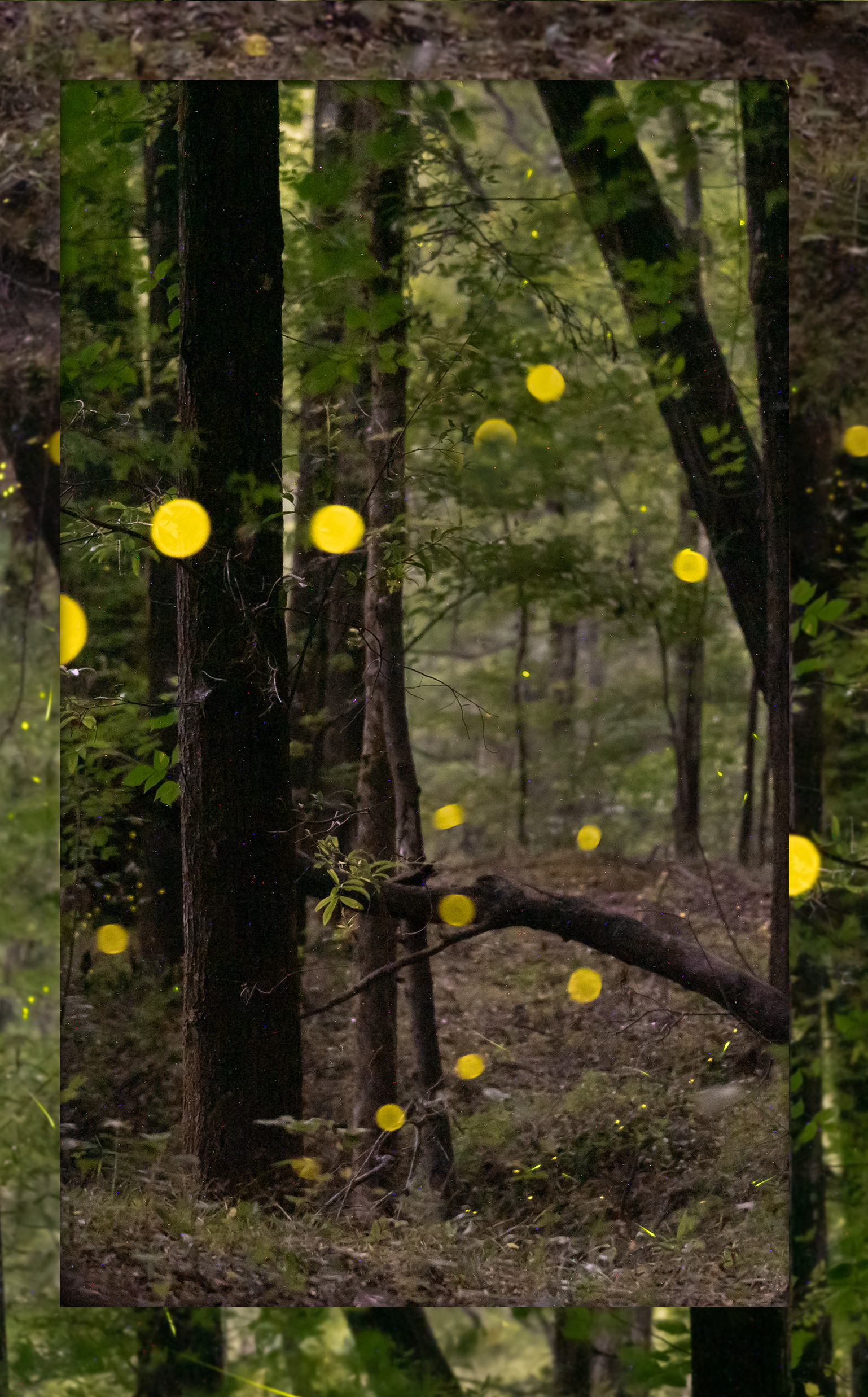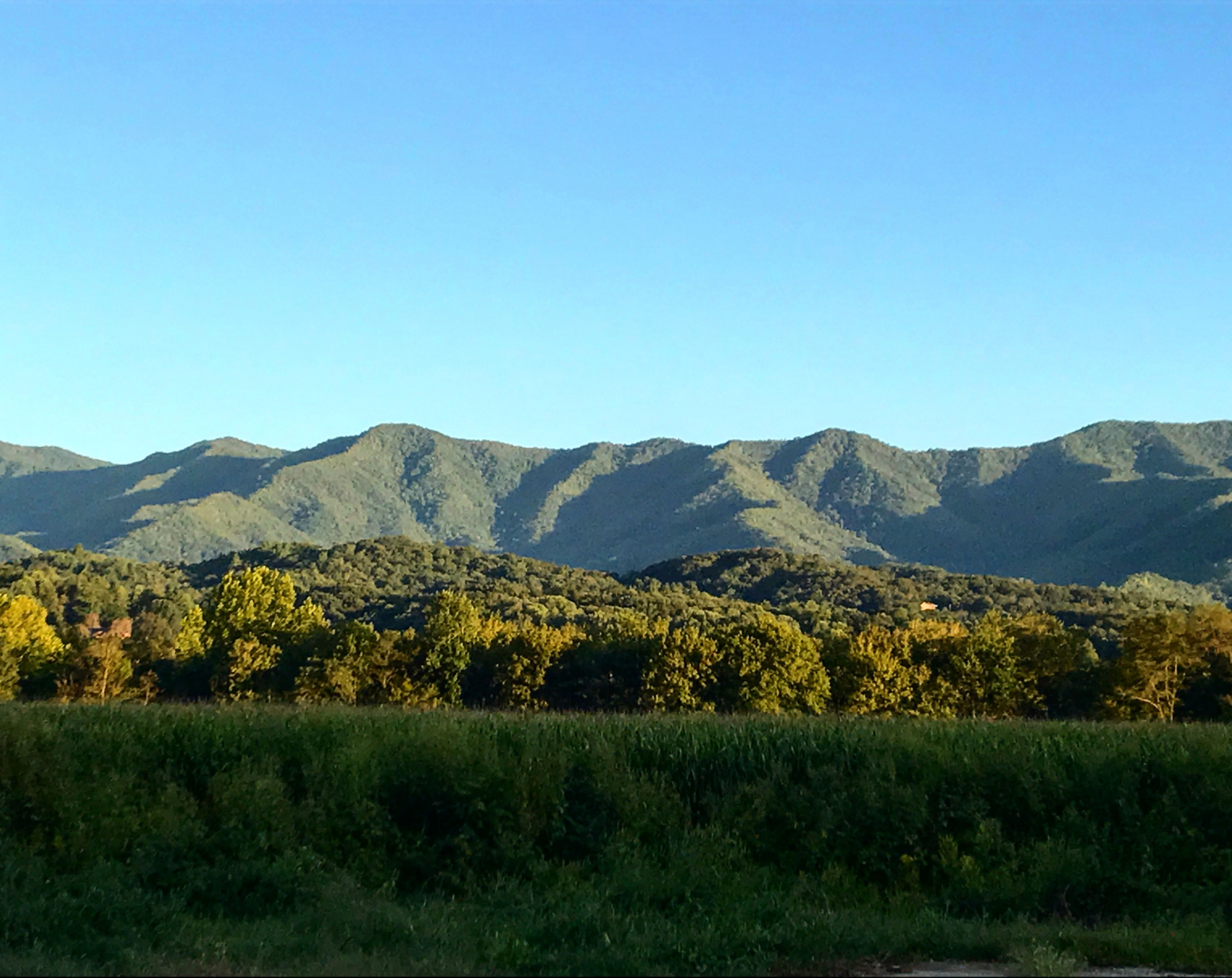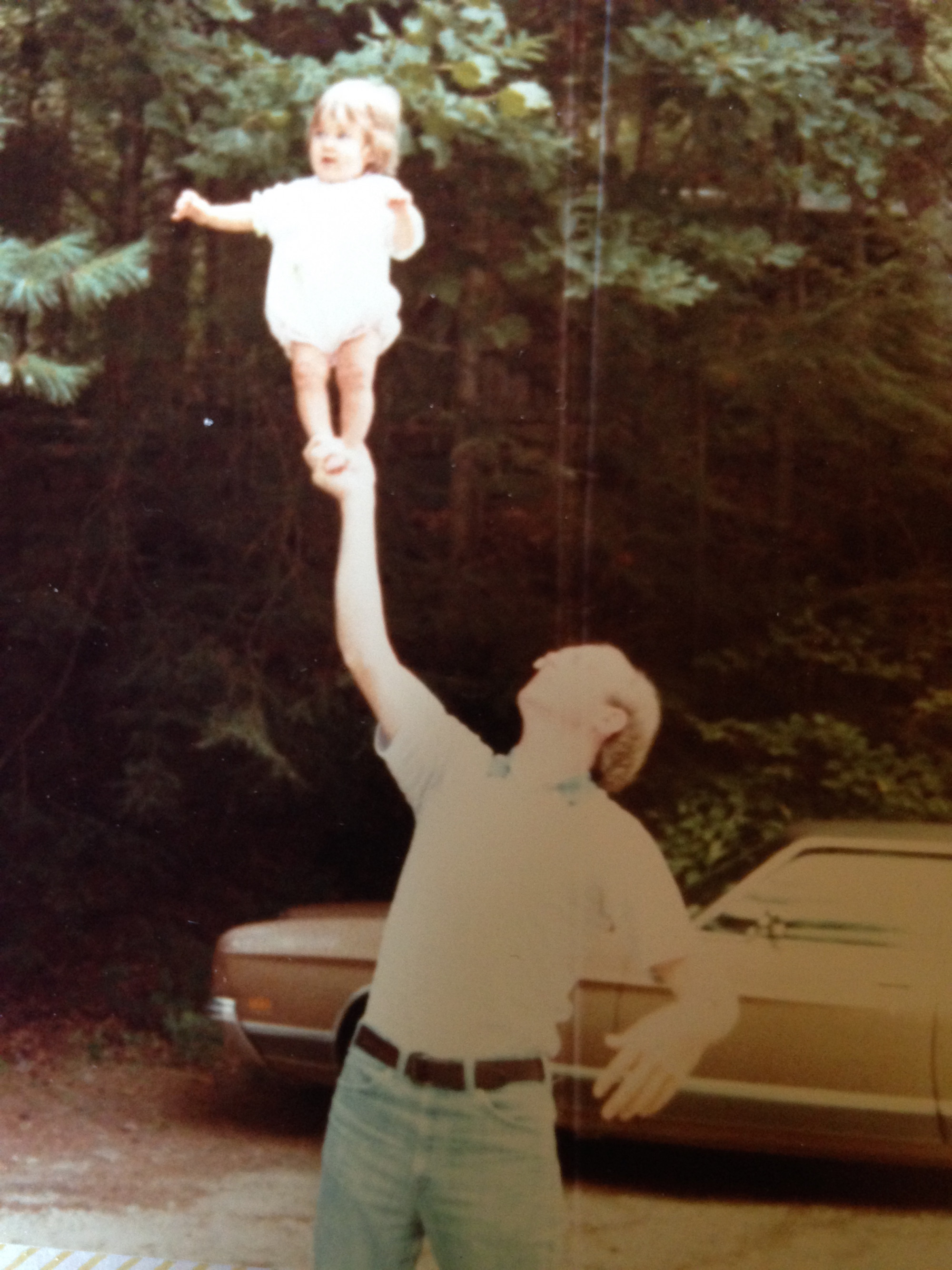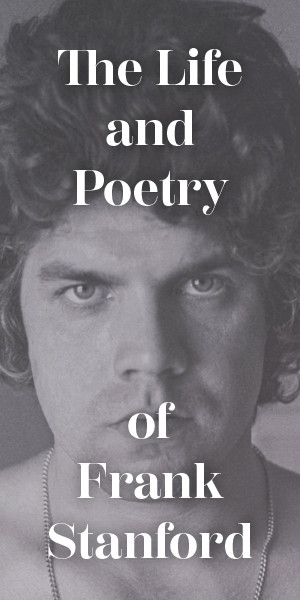The Blinking Lights in the Wood
Excerpted from All of Us Together in the End
By Matthew Vollmer

Image by Sean Rayford
On January 20, 2020, the first case of the coronavirus was detected in the United States. On this day, however, the word “coronavirus” was not trending on Twitter. Neither was “COVID-19.” Or “quarantine.” Or “pandemic.” What terms were trending? “CurbYourEnthusiasm.” And “Venus Williams” and “Warren and Klobuchar.” The words “coronavirus” or “COVID-19” did not appear on the front page of the New York Times. Very few people in the United States, it seemed, were talking about the virus. Nobody I knew had been. Neither had I. I’d been too busy talking to anybody who would listen about the lights that had been appearing after dark in the woods where my father lived, a stone’s throw from our family cemetery, on a hundred acres of wilderness bordering national forest in the mountains of western North Carolina. Nobody knew what to make of them.
One month before, on December 21, 2019—the longest night of the year—I was taking a post-sunset walk, following an asphalt trail that meandered through the nearby municipal golf course adjacent to my neighborhood, toward the top of a hill that happened to be the highest point in the town of Blacksburg, Virginia, a spot that allowed visitors to view, during the daylight hours, the icons of our little town: the football stadium, the turret of the colossal administration building, the coal plant, the futuristic-looking arts center, and distant mountain ridges. My wife and son also enjoyed this view, but I usually took these walks alone, to clear my head after a long day of teaching and reading and writing. Hours earlier, I’d attended a Virginia Tech basketball game with my friend Robert and his thirteen-year-old son Felix, the latter of whom had floated an idea he’d heard a YouTuber endorse: that, as the Mayans had predicted, the universe had ended in 2012. We were now living in a simulation, which explained why everything these days seemed so messed up. Admittedly, this was an intriguing theory to consider as I walked through the longest night of the year, which so far happened to be moonless. A smattering of stars appeared in the sky, clotted here and there with tufts of cloud drifting low enough to reflect the pinkish lights of the town center and the Virginia Tech campus.
So… convincing, I thought to myself.
I meant “the reality of it all.”
Like, what I was seeing.
It all seemed so believable.
As had become my habit on these walks of mine, I decided to call my father. For the previous three months since my mother had died, he’d been living by himself on a remote piece of property in the mountains of southwestern North Carolina, in the big brick house that he and Mom had moved into when I was sixteen. I’d often imagined—though he’d claimed this was not the case—that he might be lonely.
“Hello?” he said.
“Hey,” I said. “What am I interrupting?”
That was his line, the one he used whenever he called me.
“Well,” he replied. “I’ve been meaning to tell you. Some weird stuff’s been happening.”

Photograph by Matthew Vollmer. Courtesy the author
This wasn’t news. Weird stuff had been happening for a while. The weirdest of all? My mother, at the improbably young age of 73, had died. Even though I’d been there to help lower her coffin into the grave in our family cemetery—a clearing in the woods behind my parents’ house on land that my grandparents had originally purchased nearly forty years before—I often caught myself wondering: Where did she go? Everyone who’d known her had come to accept, more or less, how she would die—she’d been diagnosed with dementia in her mid-sixties, and then Alzheimer’s, and then, finally, Parkinson’s—but the fact of her disappearance seemed no less incomprehensible. You see, once upon a time, my mother had been a dynamo. She whipped up extravagant meals, canned vegetables, baked bread, tended to flowers, managed finances and my father’s dental office, served as leader for the so-called “fruit program” that sold boxes of Florida citrus to local town folk in order to raise funds for our local church school, practiced the hymns she would play on the piano for church on Saturday morning, led religious educational classes for young children, corresponded with family members and distant friends, made trips to visit her parents and siblings in upstate South Carolina, refilled hummingbird feeders, read her Bible, drank cups of instant coffee, ate chocolate chip cookies, and laughed. Everyone in my family—on both sides—expected that she’d be the last to go: that, as they wilted into the fragilities of senescence, she would be taking care of them. A decade before, it would’ve been impossible for any of our family members to imagine that she’d slowly expire three months before her seventy-fourth birthday. Of course, years before that, she’d stopped becoming herself. We all missed the versions of my mother before she’d disappeared for good. Once she was gone, we simply missed the person she’d always been: daughter, friend, sister, wife, mother. As her eldest son, her disappearance imbued me with a new superpower: by imagining her standing in her kitchen, long before she could’ve had the wherewithal to imagine her future demise, I could make myself cry.
I was therefore at all times and anywhere thirty seconds away from tears.
For two nights, my father said, he’d looked out his bedroom window, down the grassy hill to the pond. There, in the woods, he’d observed a number of lights—in various places—flashing. A light would appear and disappear as quickly: bright, brief flashes. A few seconds later, others would appear somewhere else. According to my father, these lights never moved. That is, he had not been able to observe them as they moved. He’d only been able to perceive how they’d reappeared in different locations, giving the impression that there were either many lights or one single source that reignited after repositioning itself.
His first explanation? Coon hunters. Even so: he hadn’t heard any dogs. Also? The flashes hadn’t behaved like flashlights. Hadn’t appeared as beams. Hadn’t swung through the dark. They’d simply flashed very quickly on and off. Like mysterious signals. Or, and this seemed more likely, like the result of pranksters playing elaborate tricks. My father had considered driving his Highlander down the road to get closer. He’d imagined retracting his sunroof and firing a shotgun into the air. I didn’t ask why, though I supposed he’d figured this might serve as a kind of warning. A shotgun, he’d assured me, fired skyward, wouldn’t hurt anybody.
“I could be standing on the porch,” he said, “and you could be down by the pond, and I could shoot at you with a shotgun, and nothing would happen.”
“So, now what?”
He didn’t know. The night before he’d convinced himself the lights had been the result of wind-jostled branches scraping against power lines and causing sparks, but the next morning, he’d thought no and disparaged this idea as “dumb.” He’d walked to the place where, according to his estimation, the lights had appeared and followed a trail winding to the ridgetop. He hadn’t found anything, though he’d confirmed something he’d already known: the woods were too densely tangled to negotiate properly. In addition to trees, the forest housed too many vines and briars and rhododendrons for anyone to navigate at the speed the flashes would have required. He couldn’t say what he’d seen. Even so, he’d convinced himself of one thing for sure: the lights were not human in origin.
“Maybe,” I suggested, “it’s mom trying to get in touch with us.”
Dad ignored me. He knew that I knew he didn’t believe in ghosts. His religion wouldn’t allow it. My father had no other choice, on the first day of winter, and the longest night of the year, but to keep watch and to wait.
I’ve always known that my father was famous in our town because he was a very good dentist, and that he was not like any of the other dentists that I knew. And I happened to know an absurd number of dentists. My grandfather—my mother’s father—had been a dentist, and one of his sons had been a dentist. My mother’s youngest sister had married a dentist. Two of my cousins became dentists; another of my cousins married one. And because my father had gone to dental school, many of his classmates, who remained some of his best friends, also worked as dentists, and their wives were often or had been, like my own mother before she’d had children, dental hygienists. And because the denomination to which the vast majority of our family members pledged allegiance—the Seventh-day Adventist Church—had been shaped, at least in part, in opposition to mainstream society, and because its founders had seen fit to organize the construction of its own educational institutions, and had thereby manufactured its own idiosyncratic and insular culture and society, one that was interested in both spreading the gospel and maintaining the very good health of its members, as well as its fellow humans, many people who’d been raised in the church and had matriculated through its elementary, secondary, and advanced educational institutions became pastors or teachers or medical professionals. Of those medical professionals, many became physicians. Many also became dentists.
Unlike other dentists I knew, my father did not drive expensive cars or play the stock market. He did not, despite the suggestions of health care management professionals, avoid making friends with his staff, but instead became a kind of father figure to the women—affectionately called “the girls” by both my parents—who worked for him: a confidant in whom they trusted for advice about boyfriends, ex-husbands, kids, and managing credit card debt. For years, he drove a beat-up Ford truck, the inside of which was littered with magazine inserts, dirt clods, packets of stale Trident sugar-free gum, mint-flavored dental floss, and cardboard boxes of rubber gloves. His shoes—and most of his clothes—he’d been cycling through for decades. Unlike other dentists, who packed as many patients into a day as possible, my father did not hurry. He had no quotas, and for many years avoided thinking about money to the extent that if a patient couldn’t or simply refused to pay, he declined to track them down. He worked slowly. Patiently. Carefully. He tapped gently on gumlines to test whether Novocain had taken effect and, if necessary, repeated injections. Patients often exited his office with drooling mouths stuffed with bloody gauze, dazed by the fact that they hadn’t felt a thing. I’d witnessed that kind of scene unfold a hundred times. As a kid, I’d spent entire days in that office, watching I Dream of Jeannie and Bewitched on a tiny television in the dental lab, where the girls stirred impression mixture in flexible green bowls or visited the fridge to pour shots of Diet Pepsi into Dixie cups. Periodically, my father would call me to an examination room, saying, “I’d like you to meet my girlfriend,” and there, beaming in the dental chair, would be a little old lady whose gnarled hands squeezed his.
My father’s patients loved being at the center of his attention. They brought him sacks of tomatoes and okra and corn and potatoes. Jars of honey. Venison jerky. Hand-carved walking sticks. Quilts. Knives with pearlescent handles. Jellied rhubarb in jars with stickered lids that recorded the dates of the canning in scrawling cursive. Buckeyes, for good luck. He befriended bulldozer operators, postal clerks, high school teachers, retirees from Florida, ex-Olympians, ex-cons, masseuses, farmers, real estate agents, mechanics, prisoners in leg-irons, sheriffs, deputies, drug addicts, covert marijuana farmers, lawyers, carpenters, pharmacists, and conspiracy-theory-peddling militiamen. There was the bank teller who’d never been caught without makeup, not even when she mowed her lawn. The ruddy, big-cheeked, pot-bellied man who rode a moped and claimed to be the first cousin of Xavier Roberts, inventor of the Cabbage Patch Doll. The one-eared man who kept a dried-up “bear pussy” in his billfold, which, according to my father, was “a wad of dried-up skin and hair.” The jailer who relayed stories about the kinds of objects that female prisoners had stuffed up their respective buttholes: a carton of cigarettes, in one instance, an entire bedsheet, in another.
In a snapshot from the early ’70s, my father wears a round helmet glowing with a corona of reflected sunlight, and straddles a motorcycle as it flies over a sand dune. He’s always been a show-off. A daredevil. He crashed at least a dozen cars before he turned twenty. Taught himself to barefoot ski, pop wheelies in wheelchairs, grab venomous snakes by the tails. But his favorite trick—and the one that both disturbed and pleased a crowd—involved balancing a baby at the end of his outstretched hand. The stunt required one infant, preferably between three and six months: one who’d yet to learn how to stand up on her own. Gripping the baby’s tiny socked feet, my father would balance her in an outstretched arm. A broom steadied stick end on the tip of a finger could achieve a similar effect, but would’ve been far less dramatic, especially when, once my father had exhausted either his own strength or the tolerance of the baby’s parents for this particular stunt, he allowed the child to fall from her place on his palm into his other arm. The babies loved it! They’d beam and coo, as if proud to have enjoyed the sensation of standing. As if they had known that my father had helped them do something amazing.
My father also helped my mother execute something amazing: he helped her die with dignity. It was no easy feat, even if you were the World’s Most Patient Man. Because here’s the thing: if and when you lose your mind, the whole world slowly goes dark. At night, windows become opaque and reflect twisted apparitions. You can’t say what you want because as soon as you start your sentence you’ve forgotten what you wanted to say; the words vanish in your mind and your mouth downshifts to mumble. Forget writing, you can’t figure out how to use a pen. Nobody knows what’s going through your mind, but the consensus seems to lie somewhere between “not much” and “probably more than we can imagine.” In the end, you can’t walk without help. Other things you can’t do by yourself: use the bathroom, shower, or eat. If you’re lucky, though, you have a life partner. A husband. A lover. A person who talks to you in the same bemused and adoring ways that he always has. Who makes fun of you because he knows you always enjoyed being teased. Because you’ve always liked to laugh, especially at yourself. “I just cain’t he’p it,” you used to say, before you needed a napkin around your neck when you ate. Back when you’d dance poorly but with vigor: biting your lip and flapping your arms like chicken wings, laughing because this made your husband turn his face away and cover his eyes with his hands. It was ridiculous. You knew it was. That’s why you did it. You were bringing joy into the world. And filling every room you entered with laughter. And love. And light.

Photograph by Sandra Vollmer. Courtesy the author
Two years before, my father had texted me a picture of an unvarnished wooden coffin, classically heptagonal in shape, accompanied by a message that said: My casket’s almost finished. I zoomed in. I frowned.
My father was not sick, or feeble, or impaired. He certainly didn’t look seventy years old; he possessed the kind of youthful exuberance that inspired him to carry ten grocery bags at once, or backflip into the freshwater trout pond in front of his house after an afternoon of grass mowing. Though he no longer occupied the so-called “prime” of his life, and though he had a heart condition that required the taking of a daily medication, and a liver disease that necessitated he drink vast quantities of water, he was in good health, exercising moderately, and subsisting on a mostly vegetarian, legume-heavy diet. If one of his patients asked him when he was going to retire, he’d likely say that he’d been enjoying his work as a dentist now more than ever. After all, he’d been taking fewer patients and working fewer hours, giving himself more time to work on extractions and fillings, and to socialize with the amusingly idiosyncratic parade of characters that showed up in the theaters of his examination rooms. More significantly, I supposed that going to work, for my father, had been a way of exiting, if only momentarily, the reality of his home life, which, thanks to the slow and steady deletion of my mother’s capabilities, had been utterly transformed.
My family spent many a Saturday afternoon on the property where our cemetery is located. My grandparents bought the land in 1982, following my grandfather’s retirement from medicine, and that’s what we called it back then: “the Land.”
To reach the Land, we followed the old two lane that bisected the valley where our town had been built and traveled a few miles west until we reached the local airport, surrounded by corn fields whose tilled earth yielded ancient pottery and chunks of arrowheads left by the Cherokee three hundred years before. At the airport, we turned right onto another two-lane road, wound alongside a roaring creek, and forked right onto a gravel drive until it turned to nothing more than a rotten gash in jungle-thick woods. In these woods, there were bears and wild hogs and snakes, the latter with which I had firsthand experience: once, while hiking with my parents and sister, I had stepped on a copperhead that my father subsequently beat to death with his walking stick, marveling afterwards that it hadn’t bitten me. Surely, he’d said, my guardian angel had shut the mouth of that serpent. I remembered how Daniel’s angels had closed the mouths of the lions in that famous den of yore, and imagined mine grabbing the fat head of the viper and squeezing the bejeezus out of it.
Eventually, my grandparents cleared a plot on the Land and built a house next to a creek where, if you looked hard and long enough, you might spot a rainbow trout, and—if you were me, carrying a Mason jar of fish food, you’d slip and break the jar and end up with a shard piercing your arm—a little mouth of blood and fat your father would sew up in the lab of his dental office. Years later, my parents took the road to my grandparents’ house a little further and built a house of their own, a massive rectangle of brick and stone. And a short walk beyond their backyard: a clearing in the woods where our family would begin to bury its dead.
The vast majority of people who I’ve told about the blinking lights in the woods surrounding my father’s house have had the same response.
“It’s obvious,” they’ve said. “Those lights? That’s your mom.”
It was a nice thing to imagine: my beloved mother sending beneficent signals—like a ghostly Morse code—from another dimension. Such a story might’ve comforted the members of my family, supposing they could’ve brought themselves to believe such a thing. But they couldn’t. It would’ve been different if everybody in my family—aside from two uncles and a handful of cousins—hadn't belonged to the same denomination. You see, members of this church were not under any circumstances allowed to believe in ghosts. If you told an Adventist that you’d been visited by a long-lost loved one—or claimed to have witnessed a supernatural phenomenon of any kind—you were likely to receive one of two responses: either your mind was playing tricks on you, or you were being targeted by demonic forces. Either way, there was only one prescription for someone who’d been visited by a phantom. Get down on your knees, and start praying. Until you could decide whether you were crazy or Satan-adjacent.
Eventually, my father, while observing the lights, took a video with his phone.
“You need to watch it in a dark room,” he said. “Look to the right of the middle of the screen. The first couple are bright. The rest are faint.”
Finally, I thought. Evidence.
I entered a closet, shut the door, and tapped the red triangle. The screen was black. I could faintly—but only just barely—observe the jagged outline of trees along a distant ridgeline. About ten seconds in, the first light appeared: an unmistakable LED-bright flash, the quickest pin prick of light, like a firefly in fast-forward. A few others followed: nearly imperceptible, millisecond-long bursts of light. And then the video went dark.
Nobody in my family had ever given me the impression that death was something to fear. In Adventist theology, people didn’t go to heaven when they died. They didn’t go to hell. They didn’t get reincarnated or wander the earth as ghosts. They simply stopped being conscious. Or, to put it another, tautological way: when people died, they died. This was, I knew, a belief unique to our denomination, and was part of many others—including our belief that Saturday was the true day of Christian worship, a conviction that dictated we observe the Jewish Sabbath, from the hours of sundown Friday to sundown Saturday—that made our church “peculiar.” Adventists didn’t fear eternal hellfire because they knew that those infernal caverns and horned creatures wielding pitchforks, as so often depicted in popular culture, were nothing but deceptions, cooked up by Satan himself to instill fear and doubt in the minds of humans, and to besmirch the character of the Almighty, who, if he could be said to maintain the upkeep of an eternal hellfire, would have to perform an ongoing miracle to continue to keep humans, who, after all, were quite flammable, burning forever. And what kind of God would that be? Certainly not a kind or loving one.
As a child, I found this belief—that once a person died, they were, in fact, dead—quite comforting. I remember taking a smug pleasure in denigrating the portrayals I encountered in cartoons or funny pages of supposedly dead people, who were frequently drawn as transparent angels playing harps or standing, in their robes and halos, atop fluffy clouds. Such depictions I recognized as fictional. Despite what many gospel songs might have insisted, God did not call people home to heaven because he needed additional voices for His choir. Nor was anyone—no matter how despicably they’d led their lives—crying out for mercy in fiery caverns while horned demons jabbed the arrow-tipped prongs into their buttocks. Nor were the righteous dead looking down upon us from paradise; keeping watch over the rest of living humanity would mean that the dead could be said to know something, and we Adventists knew, thanks to Ecclesiastes 9:5, that what they actually knew was nothing. Therefore, the idea that a dead loved one had taken up residence in heaven was not only “not true,” it was “unbiblical.” Furthermore, our pastors often reminded us, wasn’t heaven supposed to be without tears and sorrow? How could my grandfather, for instance, the beloved family physician, look upon this sorry old world and do anything but shed tears? No way. Pa-paw was, like the rest of the dead, dead. Or, more specifically, asleep. And those sleeping in the loving mercy of the Lord Jesus’s forgiveness would be awoken on the glorious day of his return.
So, my family? We weren’t scared of death. And we weren’t afraid to die.
But the process of dying? The whole suffering in agony part? That was something we would learn, over time, to fear.




